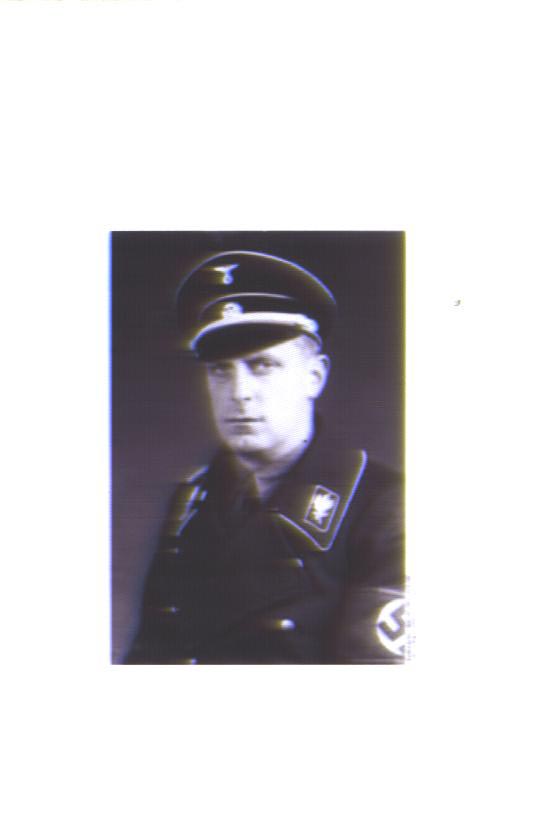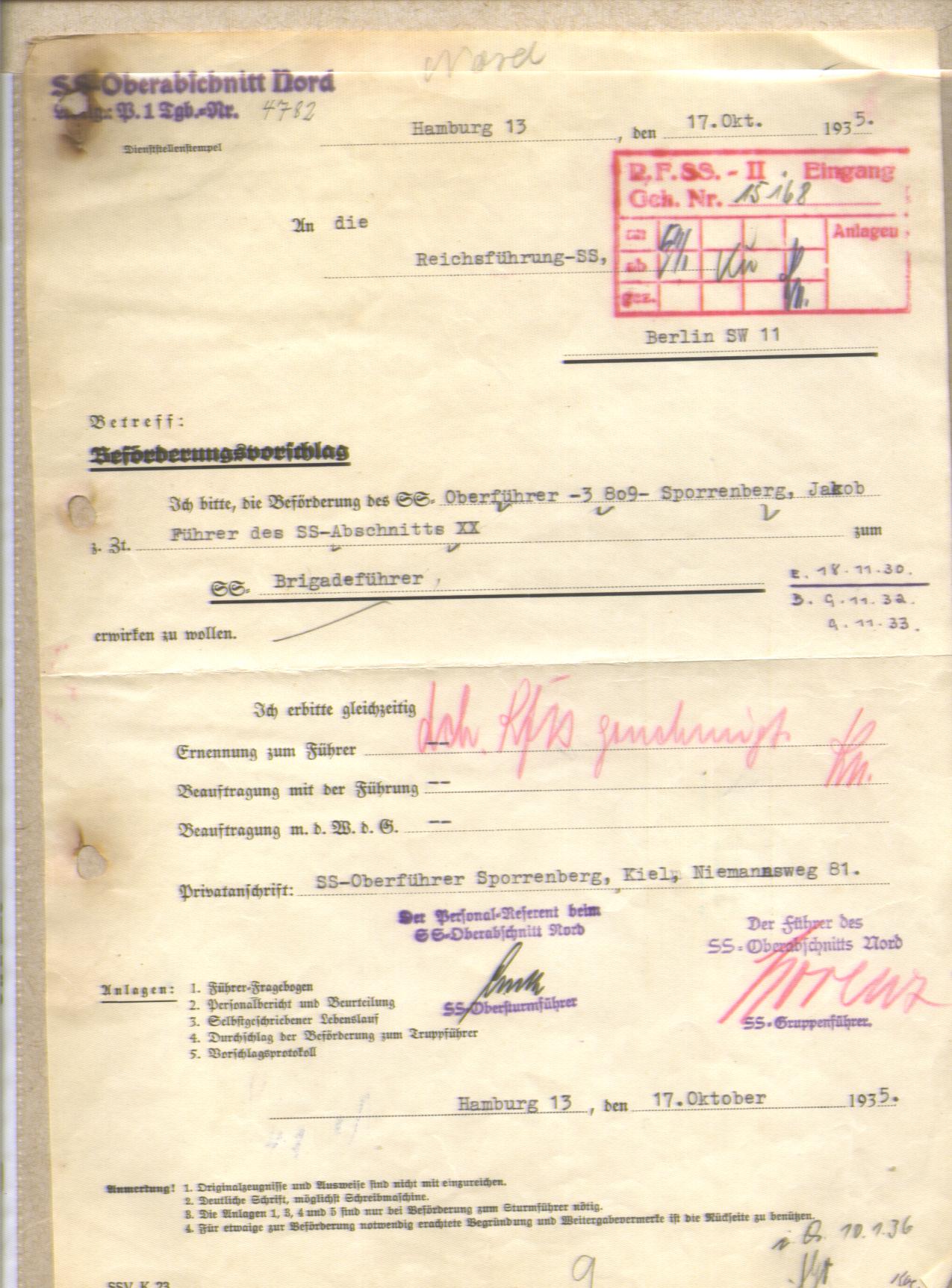

|
~SOLD~LORENZ Werner
Werner Lorenz (October 2, 1891 – March 13, 1974) was an SS functionary during the Nazi era. He was head of the Volksdeutsche Mittelstelle (VOMI) (Main Office for Ethnic Germans), an organization charged with resettling ethnic Germans in the "German Reich" from other parts of Europe, as well as colonising the occupied lands during World War II. After the war, Lorenz was sentenced to prison for crimes against humanity in 1948. He was released in 1955 and died in 1974.
Early life
He was born Grünhof (now in Gmina Postomino, Sławno County) near Stolp, Pomerania. His father was a forest warden. In 1909 Lorenz went to Military school. He served in World War I first as a cavalry officer then as a pilot in the Luftstreitkräfte. After the war he worked as a border guard and as farmer. He later acquired land and industrial property in Danzig. Through his daughter Rosemarie, Lorenz would become Axel Springer's father-in-law.
Nazi Party and SS career
In 1929 Lorenz joined the Nazi Party and the SS in 1931. Two years later he had an active political role as a member of the Landtag in the Free State of Prussia, a member of the Reichstag and worked at the Hamburg State Council.
In November 1933 Lorenz was promoted to SS-Gruppenführer and lead the SS Upper Division North in Altona from 1934 until 1937. In January 1937, was promoted to head the Nazi Party agency Volksdeutsche Mittelstelle (VOMI) that was initially responsible for the welfare of ethnic Germans (Volksdeutsche) living beyond the pre-war borders of Nazi Germany. After the Second World War began, the VOMI took charge of the resettlement of ethnic Germans on captured territory, but also the "Germanization" of foreign children such as Poles and Slovenes. Some accounts consider him the "least radical" of the higher SS leadership.
Ethnic cleansing in World War II
Following the invasion of Poland in 1939, Lorenz was the chief executive responsible for allocating confiscated land, property and managing the affairs of the Volksdeutsch in all other areas of occupied Eastern Europe. VOMI, which was an office of the Nazi Party, would take control of a district once the native populations had been driven from their homes and lands. Ethnic German settlers were then given the land to work under the direction of VOMI officials. In respect to his international work, Lorenz was plenipotentiary for foreign relations for Adolf Hitler's deputy, Rudolf Hes
In June 1941 VOMI was absorbed into the office of the Reich Commissioner for the Consolidation of German Nationhood (RKFDV) run by Reichsführer-SS Heinrich Himmler. The RKFDV, as an SS-controlled organization, had the authority to say who was German, where ethnic Germans could live, and what populations should be cleared or annihilated in order to make room for the German settlers from the east Europe during action "Heim ins Reich". As RKFDV chief, Himmler authorized the Einsatzgruppen (SS death squads) and other SS police units to round up and kill Jews, Slavs and Roma. Lorenz remained in charge of Volksdeutsch settlements in these ethnically cleansed areas. He also was responsible for VOMI officials who handled the personal property seized from Jews killed during Operation Reinhard in the General Government during 1942-1943.
In late 1942 Lorenz was seriously injured in a vehicle accident in Bosnia while overseeing the VOMI evacuation of ethnic Germans from the region. He was promoted to SS-Obergruppenführer in 1943.
Post-war
At the end of World War II, Lorenz was arrested and held in an internment camp in England. He was sentenced to 20 years in prison at the RuSHA Trial at Nuremberg on 10 March 1948. Later, his sentence was reduced and Lorenz was released from prison in 1955. He died in Hamburg in 1974.
THIS DOCUMENT PERTAINS TO JAKOB SPORRENBERG BUT IS NOT SIGNED BY HIM. DOCUMENT SIGNED BY WERNER LORENZ plus unsigned postwar picture
Jakob Sporrenberg
Jakob Sporrenberg (16 September 1902 – 6 December 1952) was a SS-Gruppenführer und Generalleutnant der Polizei in Minsk, Belarus and Lublin, Poland. After the war, Sporrenberg stood trial in Poland and was convicted in 1950 of war crimes and sentenced to death. He was executed in December 1952.
Biography
Jakob Sporrenberg was born on 16 September 1902 in Düsseldorf, Germany. Sporrenberg joined the NSDAP in 1925. In 1929 he was appointed an SA officer and one year later joined the SS, rising to the rank of SS-Brigadeführer by 1933. In January 1940, he was promoted to the rank of SS-Gruppenführer (Generalleutnant). From 1941 to 1943, he was SS and Police Leader (SSPF) in Minsk. In 1943 he was assigned to the staff of General Erich von dem Bach to combat partisans.
Sporrenberg subsequently succeeded Odilo Globocnik as SS and Police Leader of Lublin, in the Generalgouvernement of occupied Poland in August 1943. In this capacity, Sporrenberg oversaw and implemented the mass shooting of Jews during Operation "Harvest Festival"
In November 1944 Sporrenberg and several of his staff were redeployed to Norway. There Sporrenberg served as SS and Police Leader of Süd-Norwegen (South Norway). In May 1945, Sporrenberg and his staff were captured by British forces. Their interrogation shed much light on Globocnik's activities in Lublin. One outcome of his interrogation was the transfer of Sporrenberg from the PWIS Detachment (Norway) in Oslo to the MI19 interrogation centre in Kensington Palace Gardens, London, known as the "London Cage"; for further questioning by the War Crimes Interrogation Unit. This established his participation in a number of war crimes committed in Poland and the Soviet Union.
Post-war
Sporrenberg was extradited to Poland in October 1946, and sentenced to death by a Polish court in Warsaw in 1950. The sentence was carried out on 6 December 1952 when he was executed by hanging.
Sporrenberg has since been linked to the alleged German secret project Die Glocke (The Bell) by Polish writer Igor Witkowski, who claimed to have discovered the existence of Die Glocke from transcripts of an interrogation by Polish authorities of Sporrenberg. Witkowski claims to have gained access to read the transcripts through an unnamed contact in the Polish intelligence service. The interrogation and its contents have no primary documentation aside from Witkowski.
Price: $0.00
Please contact us before ordering to confirm availability and shipping costs.
Buy now with your credit card
other ways to buy
|


